初英考点精讲 同课异构 94 状语从句【知识点微课课件】
文档属性
| 名称 | 初英考点精讲 同课异构 94 状语从句【知识点微课课件】 | 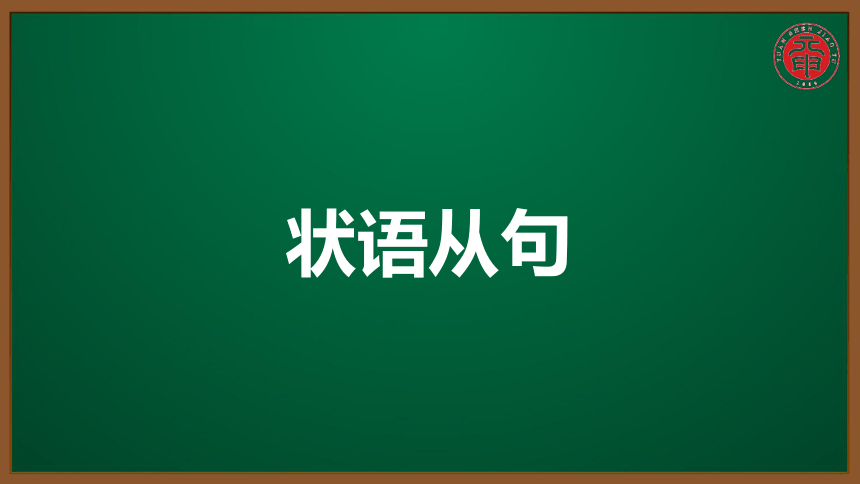 | |
| 格式 | ppt | ||
| 文件大小 | 656.5KB | ||
| 资源类型 | 试卷 | ||
| 版本资源 | 通用版 | ||
| 科目 | 英语 | ||
| 更新时间 | 2021-07-14 14:58:52 | ||
图片预览

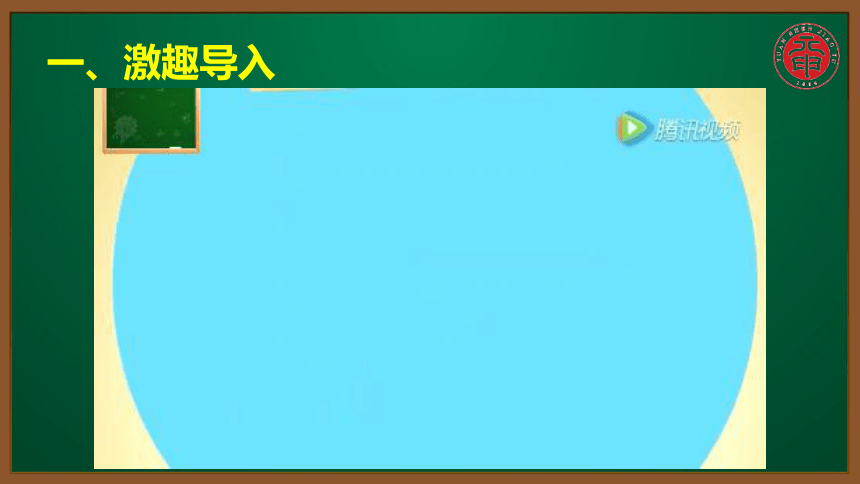
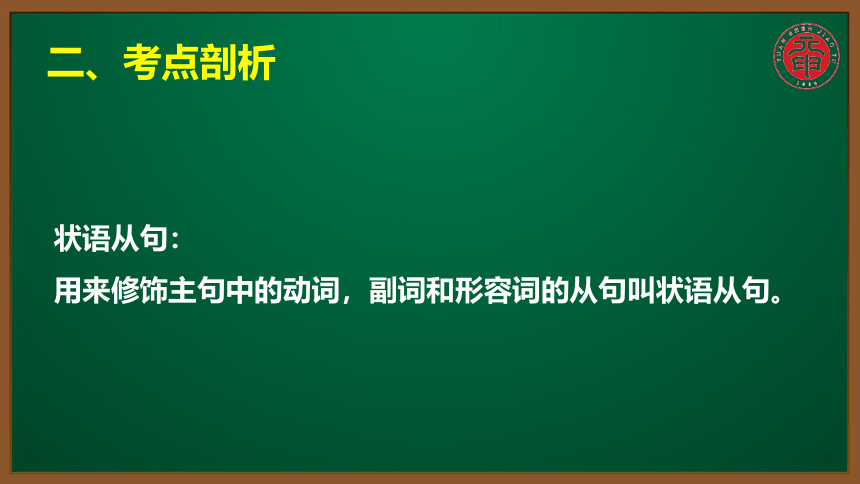
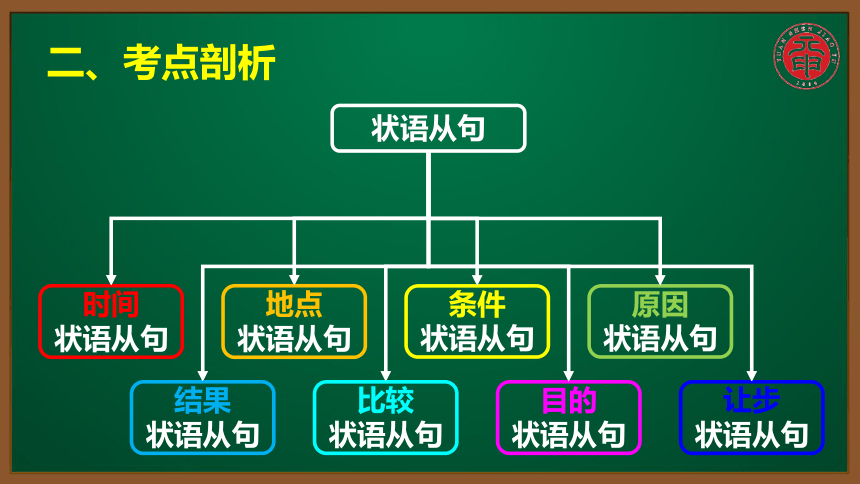
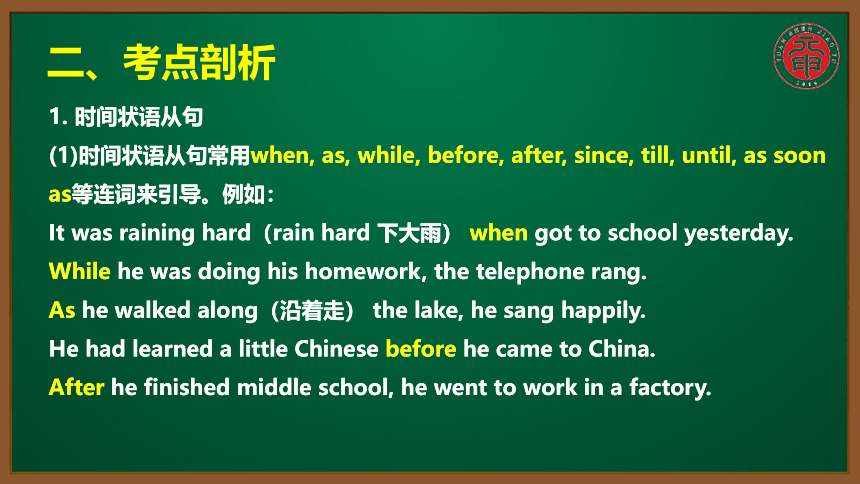
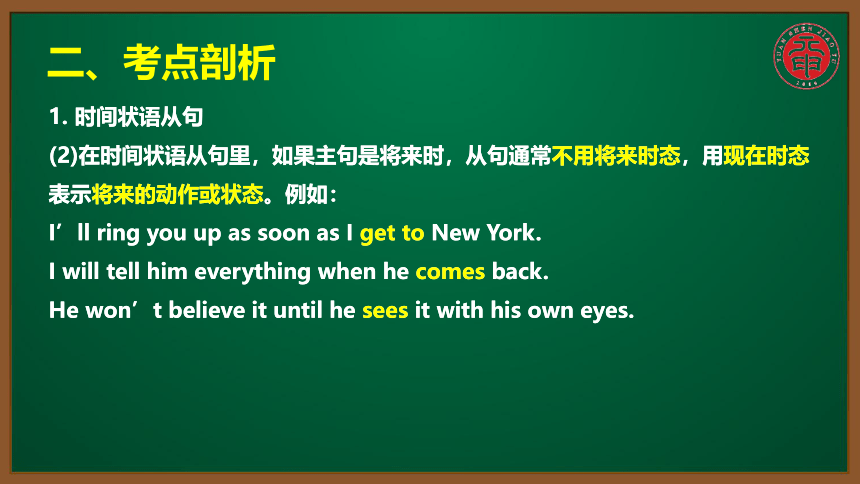
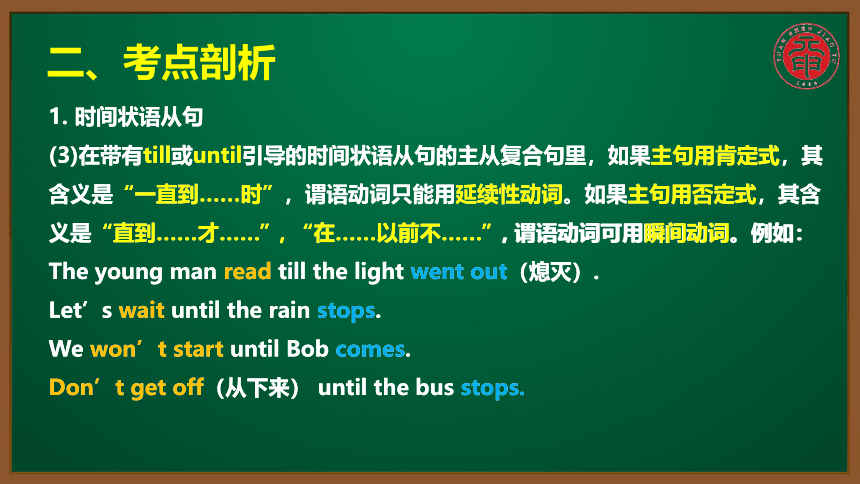
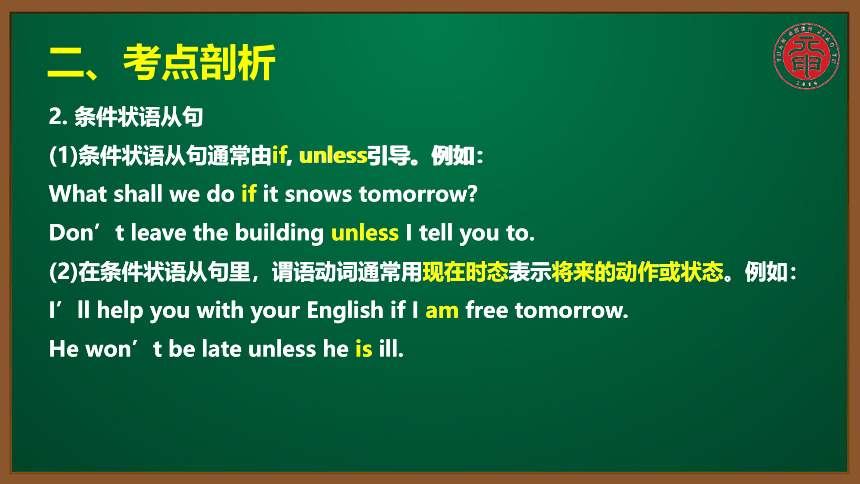
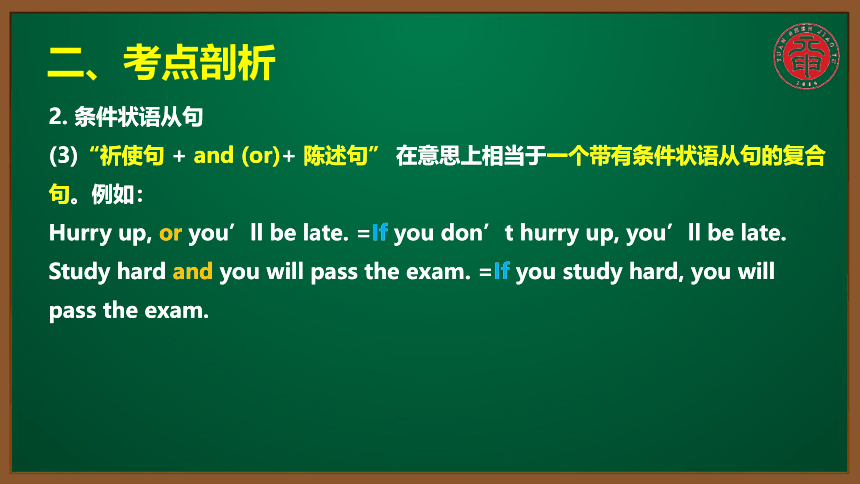
文档简介
状语从句
一、激趣导入
二、考点剖析
状语从句:
用来修饰主句中的动词,副词和形容词的从句叫状语从句。
二、考点剖析
状语从句
目的
状语从句
条件
状语从句
时间
状语从句
结果
状语从句
让步
状语从句
原因
状语从句
地点
状语从句
比较
状语从句
二、考点剖析
1. 时间状语从句
(1)时间状语从句常用when, as, while, before, after, since, till, until, as soon as等连词来引导。例如:
It was raining hard(rain hard 下大雨) when got to school yesterday.
While he was doing his homework, the telephone rang.
As he walked along(沿着走) the lake, he sang happily.
He had learned a little Chinese before he came to China.
After he finished middle school, he went to work in a factory.
1. 时间状语从句
(1)时间状语从句常用when, as, while, before, after, since, till, until, as soon as等连词来引导。例如:
It was raining hard(rain hard 下大雨) when got to school yesterday.
While he was doing his homework, the telephone rang.
As he walked along(沿着走) the lake, he sang happily.
He had learned a little Chinese before he came to China.
After he finished middle school, he went to work in a factory.
二、考点剖析
1. 时间状语从句
(2)在时间状语从句里,如果主句是将来时,从句通常不用将来时态,用现在时态表示将来的动作或状态。例如:
I’ll ring you up as soon as I get to New York.
I will tell him everything when he comes back.
He won’t believe it until he sees it with his own eyes.
1. 时间状语从句
(2)在时间状语从句里,如果主句是将来时,从句通常不用将来时态,用现在时态表示将来的动作或状态。例如:
I’ll ring you up as soon as I get to New York.
I will tell him everything when he comes back.
He won’t believe it until he sees it with his own eyes.
二、考点剖析
1. 时间状语从句
(3)在带有till或until引导的时间状语从句的主从复合句里,如果主句用肯定式,其含义是“一直到……时”,谓语动词只能用延续性动词。如果主句用否定式,其含义是“直到……才……”, “在……以前不……”, 谓语动词可用瞬间动词。例如:
The young man read till the light went out(熄灭).
Let’s wait until the rain stops.
We won’t start until Bob comes.
Don’t get off(从下来) until the bus stops.
1. 时间状语从句
(3)在带有till或until引导的时间状语从句的主从复合句里,如果主句用肯定式,其含义是“一直到……时”,谓语动词只能用延续性动词。如果主句用否定式,其含义是“直到……才……”, “在……以前不……”, 谓语动词可用瞬间动词。例如:
The young man read till the light went out(熄灭).
Let’s wait until the rain stops.
We won’t start until Bob comes.
Don’t get off(从下来) until the bus stops.
二、考点剖析
2. 条件状语从句
(1)条件状语从句通常由if, unless引导。例如:
What shall we do if it snows tomorrow?
Don’t leave the building unless I tell you to.
(2)在条件状语从句里,谓语动词通常用现在时态表示将来的动作或状态。例如:
I’ll help you with your English if I am free tomorrow.
He won’t be late unless he is ill.
2. 条件状语从句
(1)条件状语从句通常由if, unless引导。例如:
What shall we do if it snows tomorrow?
Don’t leave the building unless I tell you to.
(2)在条件状语从句里,谓语动词通常用现在时态表示将来的动作或状态。例如:
I’ll help you with your English if I am free tomorrow.
He won’t be late unless he is ill.
二、考点剖析
2. 条件状语从句
(3)“祈使句 + and (or)+ 陈述句” 在意思上相当于一个带有条件状语从句的复合句。例如:
Hurry up, or you’ll be late. =If you don’t hurry up, you’ll be late.
Study hard and you will pass the exam. =If you study hard, you will pass the exam.
2. 条件状语从句
(3)“祈使句 + and (or)+ 陈述句” 在意思上相当于一个带有条件状语从句的复合句。例如:
Hurry up, or you’ll be late. =If you don’t hurry up, you’ll be late.
Study hard and you will pass the exam. =If you study hard, you will pass the exam.
二、考点剖析
3. 原因状语从句
(1)原因状语从句通常由because, since, as引导。例如:
He didn’t come to school because he was ill.
As it is raining, we shall not (不得;不应该)go the zoo.
Since you can’t answer the question, I’ll ask someone else.
(2) because和so不能同用在一个句子里。
3. 原因状语从句
(1)原因状语从句通常由because, since, as引导。例如:
He didn’t come to school because he was ill.
As it is raining, we shall not (不得;不应该)go the zoo.
Since you can’t answer the question, I’ll ask someone else.
(2) because和so不能同用在一个句子里。
二、考点剖析
3. 原因状语从句
(3)because表示直接原因,语气最强。Because引导的原因状语从句多放在主句之后。回答由why提出的问题,只能用because。
As和since语气较弱,一般用来表示明显的原因。由as和since引导的原因状语从居多放在句首。例如:
------Why aren’t going there?
------Because I don’t want to.
As he has no car, he can’t get there easily.
Since we have no money, we can’t buy it.
3. 原因状语从句
(3)because表示直接原因,语气最强。Because引导的原因状语从句多放在主句之后。回答由why提出的问题,只能用because。
As和since语气较弱,一般用来表示明显的原因。由as和since引导的原因状语从居多放在句首。例如:
------Why aren’t going there?
------Because I don’t want to.
As he has no car, he can’t get there easily.
Since we have no money, we can’t buy it.
二、考点剖析
4. 结果状语从句
(1)结果状语从句由so…that, such…that, so that引导。例如:
He is so poor that he can’t buy a bike for his son.
She is such a good teacher that everybody likes her.
(2)如果名词前由many, much, little, few等词修饰时,只能用so, 不用such。例如:
Soon there were so many deer that they ate up all the wild roses.
He has so little time that he can’t go to the cinema with you.
4. 结果状语从句
(1)结果状语从句由so…that, such…that, so that引导。例如:
He is so poor that he can’t buy a bike for his son.
She is such a good teacher that everybody likes her.
(2)如果名词前由many, much, little, few等词修饰时,只能用so, 不用such。例如:
Soon there were so many deer that they ate up all the wild roses.
He has so little time that he can’t go to the cinema with you.
二、考点剖析
4. 结果状语从句
(3)so…that与such...that可以互换。例如:
在由so...that引导的结果状语从句中,so是副词,与形容词连用。其结构是: “...so + 形容词(副词)+ that + 从句”。
在由such…that引导的结果状语从句中,such是形容词,它修饰的可以是单数或复数可数名词,也可以是不可数名词;名词前面可以带形容词,也可不带。如果是单数可数名词,前面需加不定冠词a或an。例如:
It was such a wonderful film that all of us wanted to see it again.
=The film was so wonderful that all of us wanted to see it again.
4. 结果状语从句
(3)so…that与such...that可以互换。例如:
在由so...that引导的结果状语从句中,so是副词,与形容词连用。其结构是: “...so + 形容词(副词)+ that + 从句”。
在由such…that引导的结果状语从句中,such是形容词,它修饰的可以是单数或复数可数名词,也可以是不可数名词;名词前面可以带形容词,也可不带。如果是单数可数名词,前面需加不定冠词a或an。例如:
It was such a wonderful film that all of us wanted to see it again.
=The film was so wonderful that all of us wanted to see it again.
二、考点剖析
5. 比较状语从句
比较状语从句通常由as…as, 比较级 + than…等连词引导。例如:
Tom runs faster than John does.
This classroom is as big as that one.
6. 地点状语从句
地点状语从句常常由where来引导。例如:
Go where you like.
Where there is a will, there is a way.
5. 比较状语从句
比较状语从句通常由as…as, 比较级 + than…等连词引导。例如:
Tom runs faster than John does.
This classroom is as big as that one.
6. 地点状语从句
地点状语从句常常由where来引导。例如:
Go where you like.
Where there is a will, there is a way.
二、考点剖析
7. 目的状语从句
(1)目的状语从句通常由 so that, in order that(为了,以便)引导。例如:
We started early so that we could catch the first train.
He studies hard so that he could work better in the future.
We used the computer in order that we might save time.
(2)so that既可引导目的状语从句,又可引导结果状语从句。区别这两种从句的办法有两个:1)目的状语从句里往往带有情态动词can, could, may, might等。2)从意思上看,目的状语从句往往表示的目的很明确。例如:
Speak clearly so that they may understand you. (目的状语从句)
Jack is badly ill so that he has to rest. (结果状语从句)
7. 目的状语从句
(1)目的状语从句通常由 so that, in order that(为了,以便)引导。例如:
We started early so that we could catch the first train.
He studies hard so that he could work better in the future.
We used the computer in order that we might save time.
(2)so that既可引导目的状语从句,又可引导结果状语从句。区别这两种从句的办法有两个:1)目的状语从句里往往带有情态动词can, could, may, might等。2)从意思上看,目的状语从句往往表示的目的很明确。例如:
Speak clearly so that they may understand you. (目的状语从句)
Jack is badly ill so that he has to rest. (结果状语从句)
二、考点剖析
8. 让步状语从句
(1)让步状语从句通常由although, though等连词引导。例如:
Though he is young, he knows a lot.
Although I am tired, I must go on working.
(2)although(though)不能用在同一个句子中。例如:
我们不能说:Though it was raining hard, but he still went out.
应该说:Though it was raining hard, he still went out.或It was raining hard, but he still went out.
8. 让步状语从句
(1)让步状语从句通常由although, though等连词引导。例如:
Though he is young, he knows a lot.
Although I am tired, I must go on working.
(2)although(though)不能用在同一个句子中。例如:
我们不能说:Though it was raining hard, but he still went out.
应该说:Though it was raining hard, he still went out.或It was raining hard, but he still went out.
1. _______ he’s old, he can still carry this heavy bag.
A. Though B. Since C. For D. So
2. ---Do you know if he _______ to play basketball with us?
---I think he will come if he ______ free tomorrow.
A. comes; is B. comes; will be C. will come; is D. will come; will be
3. In the zoo if a child _____ into the water and can’t swim, the dolphins may come up ______ him.
A. will fall; to help B. falls; to help C. will fall; help D. falls; helping
4. I don’t remember ________ he worked in that city when he was young.
A. what B. which C. where D. who
5. We will stay at home if my aunt ________ to visit us tomorrow.
A. comes B. come C. will come D. is coming
二、考点剖析
A
C
B
C
A
6. The police asked the children _______ cross the street ________ the traffic lights turned green.
A. not; before B. don’t; when C. not to; until D. not; after
7. I was late for class yesterday _______ there was something wrong with my bike.
A. when B. that C. until D. because
8. I’ll go swimming with you if I ________ free tomorrow.
A. will be B. shall be C. am D. was
9. In the exam, the ________ you are, the _______ mistakes you will make.
A. careful; little B. more careful; fewest
C. more careful; fewer D. more careful; less
10. You should finish your lessons _______ you go out to play.
A. before B. after C. when D. while
二、考点剖析
C
D
C
C
A
三、思维导图
状语从句
时间状语从句
地点状语从句
原因状语从句
结果状语从句
目的状语从句
条件状语从句
让步状语从句
比较状语从句
when, while, as, before, after, since, till, etc
where, wherever, etc
because, since, as, for, now that, etc
so…that, so that, such…that, that, etc
in order that, so that, that, etc
if, unless, as(so)long as, etc
though, although, even if, even though, as, etc
as…as, so…as, than, etc
一、激趣导入
二、考点剖析
状语从句:
用来修饰主句中的动词,副词和形容词的从句叫状语从句。
二、考点剖析
状语从句
目的
状语从句
条件
状语从句
时间
状语从句
结果
状语从句
让步
状语从句
原因
状语从句
地点
状语从句
比较
状语从句
二、考点剖析
1. 时间状语从句
(1)时间状语从句常用when, as, while, before, after, since, till, until, as soon as等连词来引导。例如:
It was raining hard(rain hard 下大雨) when got to school yesterday.
While he was doing his homework, the telephone rang.
As he walked along(沿着走) the lake, he sang happily.
He had learned a little Chinese before he came to China.
After he finished middle school, he went to work in a factory.
1. 时间状语从句
(1)时间状语从句常用when, as, while, before, after, since, till, until, as soon as等连词来引导。例如:
It was raining hard(rain hard 下大雨) when got to school yesterday.
While he was doing his homework, the telephone rang.
As he walked along(沿着走) the lake, he sang happily.
He had learned a little Chinese before he came to China.
After he finished middle school, he went to work in a factory.
二、考点剖析
1. 时间状语从句
(2)在时间状语从句里,如果主句是将来时,从句通常不用将来时态,用现在时态表示将来的动作或状态。例如:
I’ll ring you up as soon as I get to New York.
I will tell him everything when he comes back.
He won’t believe it until he sees it with his own eyes.
1. 时间状语从句
(2)在时间状语从句里,如果主句是将来时,从句通常不用将来时态,用现在时态表示将来的动作或状态。例如:
I’ll ring you up as soon as I get to New York.
I will tell him everything when he comes back.
He won’t believe it until he sees it with his own eyes.
二、考点剖析
1. 时间状语从句
(3)在带有till或until引导的时间状语从句的主从复合句里,如果主句用肯定式,其含义是“一直到……时”,谓语动词只能用延续性动词。如果主句用否定式,其含义是“直到……才……”, “在……以前不……”, 谓语动词可用瞬间动词。例如:
The young man read till the light went out(熄灭).
Let’s wait until the rain stops.
We won’t start until Bob comes.
Don’t get off(从下来) until the bus stops.
1. 时间状语从句
(3)在带有till或until引导的时间状语从句的主从复合句里,如果主句用肯定式,其含义是“一直到……时”,谓语动词只能用延续性动词。如果主句用否定式,其含义是“直到……才……”, “在……以前不……”, 谓语动词可用瞬间动词。例如:
The young man read till the light went out(熄灭).
Let’s wait until the rain stops.
We won’t start until Bob comes.
Don’t get off(从下来) until the bus stops.
二、考点剖析
2. 条件状语从句
(1)条件状语从句通常由if, unless引导。例如:
What shall we do if it snows tomorrow?
Don’t leave the building unless I tell you to.
(2)在条件状语从句里,谓语动词通常用现在时态表示将来的动作或状态。例如:
I’ll help you with your English if I am free tomorrow.
He won’t be late unless he is ill.
2. 条件状语从句
(1)条件状语从句通常由if, unless引导。例如:
What shall we do if it snows tomorrow?
Don’t leave the building unless I tell you to.
(2)在条件状语从句里,谓语动词通常用现在时态表示将来的动作或状态。例如:
I’ll help you with your English if I am free tomorrow.
He won’t be late unless he is ill.
二、考点剖析
2. 条件状语从句
(3)“祈使句 + and (or)+ 陈述句” 在意思上相当于一个带有条件状语从句的复合句。例如:
Hurry up, or you’ll be late. =If you don’t hurry up, you’ll be late.
Study hard and you will pass the exam. =If you study hard, you will pass the exam.
2. 条件状语从句
(3)“祈使句 + and (or)+ 陈述句” 在意思上相当于一个带有条件状语从句的复合句。例如:
Hurry up, or you’ll be late. =If you don’t hurry up, you’ll be late.
Study hard and you will pass the exam. =If you study hard, you will pass the exam.
二、考点剖析
3. 原因状语从句
(1)原因状语从句通常由because, since, as引导。例如:
He didn’t come to school because he was ill.
As it is raining, we shall not (不得;不应该)go the zoo.
Since you can’t answer the question, I’ll ask someone else.
(2) because和so不能同用在一个句子里。
3. 原因状语从句
(1)原因状语从句通常由because, since, as引导。例如:
He didn’t come to school because he was ill.
As it is raining, we shall not (不得;不应该)go the zoo.
Since you can’t answer the question, I’ll ask someone else.
(2) because和so不能同用在一个句子里。
二、考点剖析
3. 原因状语从句
(3)because表示直接原因,语气最强。Because引导的原因状语从句多放在主句之后。回答由why提出的问题,只能用because。
As和since语气较弱,一般用来表示明显的原因。由as和since引导的原因状语从居多放在句首。例如:
------Why aren’t going there?
------Because I don’t want to.
As he has no car, he can’t get there easily.
Since we have no money, we can’t buy it.
3. 原因状语从句
(3)because表示直接原因,语气最强。Because引导的原因状语从句多放在主句之后。回答由why提出的问题,只能用because。
As和since语气较弱,一般用来表示明显的原因。由as和since引导的原因状语从居多放在句首。例如:
------Why aren’t going there?
------Because I don’t want to.
As he has no car, he can’t get there easily.
Since we have no money, we can’t buy it.
二、考点剖析
4. 结果状语从句
(1)结果状语从句由so…that, such…that, so that引导。例如:
He is so poor that he can’t buy a bike for his son.
She is such a good teacher that everybody likes her.
(2)如果名词前由many, much, little, few等词修饰时,只能用so, 不用such。例如:
Soon there were so many deer that they ate up all the wild roses.
He has so little time that he can’t go to the cinema with you.
4. 结果状语从句
(1)结果状语从句由so…that, such…that, so that引导。例如:
He is so poor that he can’t buy a bike for his son.
She is such a good teacher that everybody likes her.
(2)如果名词前由many, much, little, few等词修饰时,只能用so, 不用such。例如:
Soon there were so many deer that they ate up all the wild roses.
He has so little time that he can’t go to the cinema with you.
二、考点剖析
4. 结果状语从句
(3)so…that与such...that可以互换。例如:
在由so...that引导的结果状语从句中,so是副词,与形容词连用。其结构是: “...so + 形容词(副词)+ that + 从句”。
在由such…that引导的结果状语从句中,such是形容词,它修饰的可以是单数或复数可数名词,也可以是不可数名词;名词前面可以带形容词,也可不带。如果是单数可数名词,前面需加不定冠词a或an。例如:
It was such a wonderful film that all of us wanted to see it again.
=The film was so wonderful that all of us wanted to see it again.
4. 结果状语从句
(3)so…that与such...that可以互换。例如:
在由so...that引导的结果状语从句中,so是副词,与形容词连用。其结构是: “...so + 形容词(副词)+ that + 从句”。
在由such…that引导的结果状语从句中,such是形容词,它修饰的可以是单数或复数可数名词,也可以是不可数名词;名词前面可以带形容词,也可不带。如果是单数可数名词,前面需加不定冠词a或an。例如:
It was such a wonderful film that all of us wanted to see it again.
=The film was so wonderful that all of us wanted to see it again.
二、考点剖析
5. 比较状语从句
比较状语从句通常由as…as, 比较级 + than…等连词引导。例如:
Tom runs faster than John does.
This classroom is as big as that one.
6. 地点状语从句
地点状语从句常常由where来引导。例如:
Go where you like.
Where there is a will, there is a way.
5. 比较状语从句
比较状语从句通常由as…as, 比较级 + than…等连词引导。例如:
Tom runs faster than John does.
This classroom is as big as that one.
6. 地点状语从句
地点状语从句常常由where来引导。例如:
Go where you like.
Where there is a will, there is a way.
二、考点剖析
7. 目的状语从句
(1)目的状语从句通常由 so that, in order that(为了,以便)引导。例如:
We started early so that we could catch the first train.
He studies hard so that he could work better in the future.
We used the computer in order that we might save time.
(2)so that既可引导目的状语从句,又可引导结果状语从句。区别这两种从句的办法有两个:1)目的状语从句里往往带有情态动词can, could, may, might等。2)从意思上看,目的状语从句往往表示的目的很明确。例如:
Speak clearly so that they may understand you. (目的状语从句)
Jack is badly ill so that he has to rest. (结果状语从句)
7. 目的状语从句
(1)目的状语从句通常由 so that, in order that(为了,以便)引导。例如:
We started early so that we could catch the first train.
He studies hard so that he could work better in the future.
We used the computer in order that we might save time.
(2)so that既可引导目的状语从句,又可引导结果状语从句。区别这两种从句的办法有两个:1)目的状语从句里往往带有情态动词can, could, may, might等。2)从意思上看,目的状语从句往往表示的目的很明确。例如:
Speak clearly so that they may understand you. (目的状语从句)
Jack is badly ill so that he has to rest. (结果状语从句)
二、考点剖析
8. 让步状语从句
(1)让步状语从句通常由although, though等连词引导。例如:
Though he is young, he knows a lot.
Although I am tired, I must go on working.
(2)although(though)不能用在同一个句子中。例如:
我们不能说:Though it was raining hard, but he still went out.
应该说:Though it was raining hard, he still went out.或It was raining hard, but he still went out.
8. 让步状语从句
(1)让步状语从句通常由although, though等连词引导。例如:
Though he is young, he knows a lot.
Although I am tired, I must go on working.
(2)although(though)不能用在同一个句子中。例如:
我们不能说:Though it was raining hard, but he still went out.
应该说:Though it was raining hard, he still went out.或It was raining hard, but he still went out.
1. _______ he’s old, he can still carry this heavy bag.
A. Though B. Since C. For D. So
2. ---Do you know if he _______ to play basketball with us?
---I think he will come if he ______ free tomorrow.
A. comes; is B. comes; will be C. will come; is D. will come; will be
3. In the zoo if a child _____ into the water and can’t swim, the dolphins may come up ______ him.
A. will fall; to help B. falls; to help C. will fall; help D. falls; helping
4. I don’t remember ________ he worked in that city when he was young.
A. what B. which C. where D. who
5. We will stay at home if my aunt ________ to visit us tomorrow.
A. comes B. come C. will come D. is coming
二、考点剖析
A
C
B
C
A
6. The police asked the children _______ cross the street ________ the traffic lights turned green.
A. not; before B. don’t; when C. not to; until D. not; after
7. I was late for class yesterday _______ there was something wrong with my bike.
A. when B. that C. until D. because
8. I’ll go swimming with you if I ________ free tomorrow.
A. will be B. shall be C. am D. was
9. In the exam, the ________ you are, the _______ mistakes you will make.
A. careful; little B. more careful; fewest
C. more careful; fewer D. more careful; less
10. You should finish your lessons _______ you go out to play.
A. before B. after C. when D. while
二、考点剖析
C
D
C
C
A
三、思维导图
状语从句
时间状语从句
地点状语从句
原因状语从句
结果状语从句
目的状语从句
条件状语从句
让步状语从句
比较状语从句
when, while, as, before, after, since, till, etc
where, wherever, etc
because, since, as, for, now that, etc
so…that, so that, such…that, that, etc
in order that, so that, that, etc
if, unless, as(so)long as, etc
though, although, even if, even though, as, etc
as…as, so…as, than, etc
同课章节目录
- 词法
- 名词
- 动词和动词短语
- 动词语态
- 动词时态
- 助动词和情态动词
- 非谓语动词
- 冠词
- 代词
- 数词和量词
- 形容词副词及其比较等级
- 介词和介词短语
- 连词和感叹词
- 构词法
- 相似、相近词比较
- 句法
- 陈述句
- 一般疑问句和否定疑问句
- 特殊疑问句及选择疑问句
- 反意疑问句
- 存在句(There be句型)
- 宾语从句
- 定语从句
- 状语从句
- 主谓一致问题
- 简单句
- 并列句
- 复合句
- 主谓一致
- 主、表语从句
- 名词性从句
- 直接引语和间接引语
- 虚拟语气
- 感叹句
- 强调句
- 倒装句
- 祈使句
- 句子的成分
- 句子的分类
- 题型专区
- 单项选择部分
- 易错题
- 完形填空
- 阅读理解
- 词汇练习
- 听说训练
- 句型转换
- 补全对话
- 短文改错
- 翻译
- 书面表达
- 任务型阅读
- 语法填空
- 其他资料
